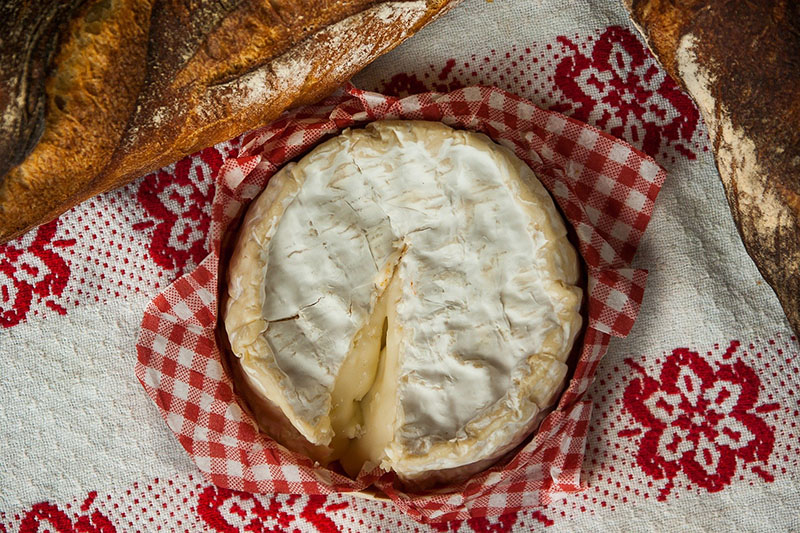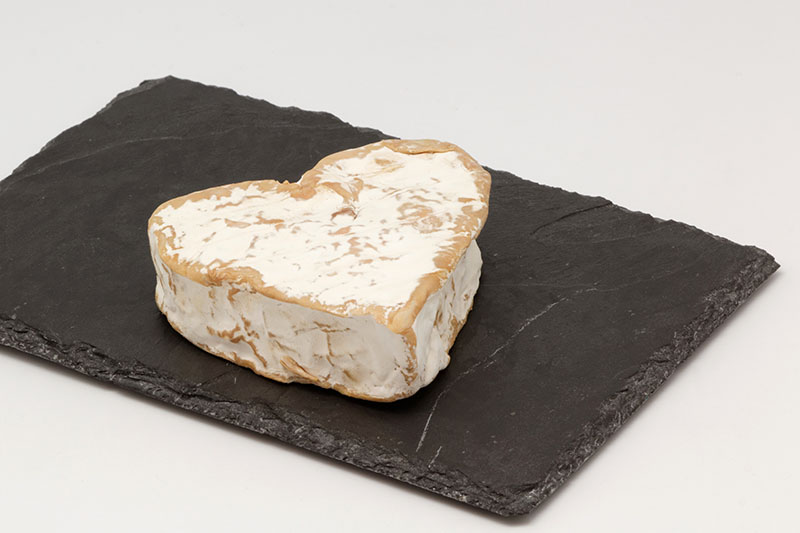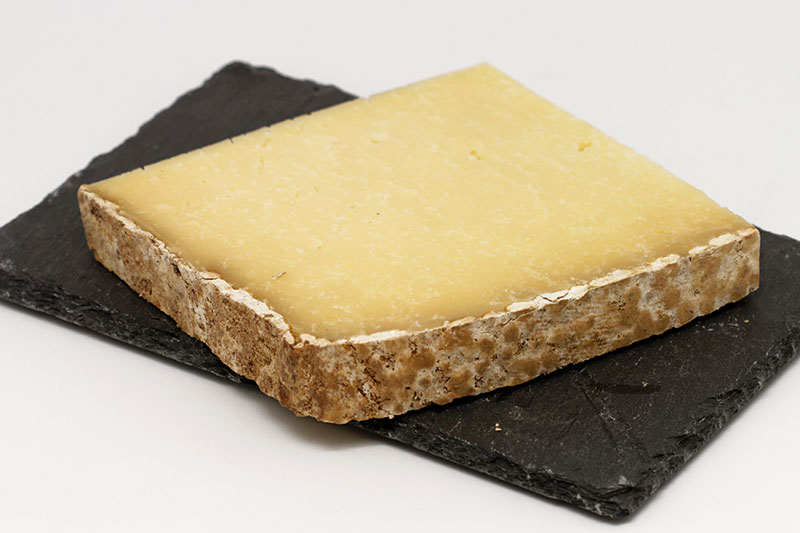“How is it possible to govern a country which produces more than 370 different cheeses?” – Charles de Gaulle.
The Ultimate Guide to French Soft Cheese

French Soft Cheese
Boursault is a triple crème cheese with a mild flavour, a slight acidity, and a hint of mushrooms. First made after the Second World War, it is a soft-ripening cheese with a smooth, buttery interior. Its cylindrical shape is covered with a white penicillin mould rind with pinkish tones. One of the great soft French cheeses.
Boursin is a triple crème cheese with a smooth, buttery texture and a rich, delicate, sweet flavour. Its cylindrical shape, without a rind, is covered with garlic and herbs or with black pepper. It is famously known for its popular advertising campaign “du pain, du vin, du Boursin”.
Brie is known as the “Queen of the soft French Cheeses.” Centuries ago it was one of the tributes (for respect and/ or allegiance) which were paid to the French kings. Made from whole, skim, or enriched milk, pasteurised or unpasteurised, it is a bloomy-rind, soft-ripening cheese with a white crust and a creamy, smooth interior. It is ripened partly by moulds, bacteria and yeasts which grow on the surface.
Brie de Meaux is considered to be one of the best French soft cheeses, if not the premier Brie in France. Made in northeast France near Paris, it was introduced at a diplomats’ dinner by Talleyrand, Napoleon’s Foreign Minister and because of its proximity to the capital, the cheese became the favourite of many Parisians, hence its popularity grew. With a white velvet, edible, bloomy rind and a subtly musty taste, its flavour is more pronounced than that of other Bries. The pâte is a pale yellow, the colour of straw.
Brie de Melun has a white, edible, bloomy rind and a musty aroma. Its robust, salty flavour is more pronounced than that of other Bries.
Brie Fermier is an unpasteurised cheese. The mould on its rind is enhanced by the ammonia-laden atmosphere of the cowshed, where it is ripened. Affinage, or ripening, takes at least two months.
Brillat-Savarin, named after the eighteenth-century French food writer, is a very creamy cheese with a soft pâte and a rind of white mould.
Camembert de Normandie is a buttery french soft cheese with a delicate, salty taste. This soft ripening cheese has a white bloomy rind and becomes creamier as it ripens over the two to three weeks after production. Named after the Normandy village in which it was invented, the cheese dates back to the French Revolution. The cheese’s creator, Marie Harel, is honoured with a statue in Camembert. Mme Harel’s daughters presented the cheese to an approving Napoleon.

Chaource, with a round shape and soft texture, is similar to Camembert. It can be eaten both young and matured. Its rind is bitter; its interior is sharp, piquant, with a hint of mushrooms.
Coulommiers is often made from a mixture of morning and evening milk. Small and wheel-shaped, it is a soft-ripening cheese with an ivory pâte and a white, bloomy rind with pinkish-brown spots. It is smaller and thicker than Brie.
Ecorce de Sapin (bark of the fir tree) is a creamy soft french cheese bound in the bark of a pine tree, resulting in an earthy flavour.
Époisses de Bourgogne is made only from milk produced within the boundaries of the village of Époisses in Burgundy. As it matures, each cheese is washed by hand in marc de Bourgogne, a distilled, locally produced spirit made from the pomace left over from wine production, similar to Italian grappa. This washing spreads bacteria over and into its rind. With a woody aroma and a strong, tangy flavour, it is a super-runny soft French cheese, both odorous and sticky. Its flavour combines the salty, the sweet, the metallic, and the milky. It can be eaten at different stages of maturity.
Langres is a semi-soft, farmhouse, washed-rind cheese. Made of unpasteurised milk in the high plains of Langres in the Champagne region, its pâte is white to light beige with a pungent, smoky-bacon aroma. Its texture is firm and grainy when young, smooth and creamy with age. With a brightly-coloured orange rind, it is cylindrical or cone-shaped with a hollow on top, into which is poured Champagne or marc.
Levart, one of the oldest soft French cheeses in Normandy, is a washed-rind cheese made of unpasteurised cow’s milk. Its flavour is stronger than that of Camembert. As it is formed, the cheese is bound in bands of rush leaves. Its rind is smooth, brilliant, and reddish-orange; its pâte is perfumed, spicy, and slightly piquant. Levart is called the “colonel” because of the stripes produced on its rim when it is bound.
Maroilles comes in many varieties, with a shape and size distinctive to each village of production. Similar to a strong Pont l’Évêque, it was created in the tenth century by monks in northern France. Its pâte is golden, soft, and oily, with a powerful aroma of fermenting fruit and smoky bacon.
Munster is a round, soft French cheese with a pungent smell and tangy flavour. Its pâte is smooth, creamy, finetextured, and golden; its orange rind is inedible. A washed-rind cheese that ripens from the inside out, it is known as Munster in the Alsace region and as Gerome in the Lorraine region.
Neufchâtel is often heart-shaped but can come in six different sizes and shapes. Its interior is custard-coloured with a grainy texture and a salty, lactic flavour. Its dry, white and velvety rind is edible.
Ossau-Iraty is a semi-soft French cheese which is wheel-shaped and comes in three sizes. With a nutty, robust flavour, the cheese is produced from June through to September when the herds graze in the high mountain meadows of the western Pyrenees.
Plaisir de Chablis is a semi-soft French cheese with an orange rind. During ripening, the cheese is washed in Chablis wine.

Pont l’Évêque is one of the oldest soft French cheeses of Normandy. A washed-rind, monastery-type cheese, its pâte is creamy, yellow, buttery, fine-textured, and smooth. Small and square in shape, it has a firmer body and a deeper yellow hue than Camembert. Its apricot or golden crust is ridged, due to its curing on straw mats.
Reblochon means “second milking,” or “to pinch a cow’s udder one more time.” It was originally known as the “tax evasion cheese” since the secret second milking of the cows occurred after the tax inspector had already measured the milk quota for the day. Produced from herds which graze in the Alpine pastures of the Savoie Mountains while the fresh milk is still warm, Reblochon is a soft, mild, washed-rind cheese with a pinkish, brownish, or reddish exterior and a cream-coloured interior. Its texture is supple and creamy; its aroma is warm and yeasty with the sweet flavour of crushed walnuts. It is often used for cooking since it melts rapidly.
Tourrée de l’Aubier has a woody aroma, a fruity flavour, and a creamy texture. As it forms, it is circled and shaped with a spruce bark belt.
Vacherie Mont d’Or, known also as Vacherin du Haut-Doubs, is an unpasteurised soft French cheese. With a pale yellow, creamy pâte and a golden, slightly reddish rind, it continues to ripen in the wooden box in which it is sold.

The Finest French Soft Cheese, Served Onboard
Enjoy a fine selection of regional French cheeses, served on our luxury barge cruises. To find out more about our onboard gastronomy, click here.
 French
French
 English
English Spanish
Spanish German
German Norwegian
Norwegian Portuguese
Portuguese Swedish
Swedish Italian
Italian Russian
Russian Simplified Chinese
Simplified Chinese Japanese
Japanese